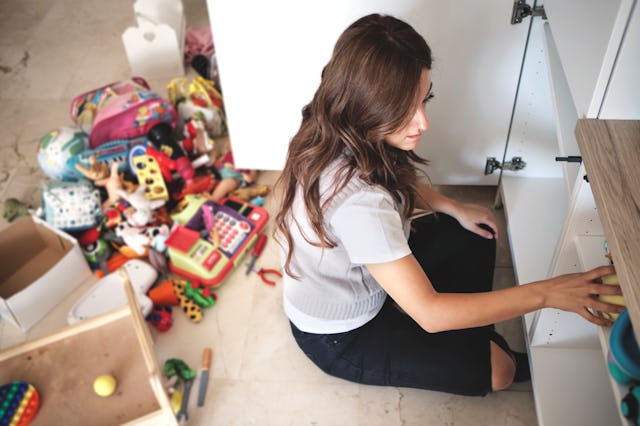Is It OK To Ask My Babysitter To Clean While My Kids Sleep?
*Tries and fails to climb out of own mess.*

Help: We all need it. And by the looks of my apartment at the end of the day, I need more help than most. Whether the blame falls on my toddler (an actual toy tornado) or my husband and I (we're two slobs stretched too thin to keep things tidy), it's not our babysitter's fault. However, given the amount of housework that clearly needs to be done, paying someone to sit on our toy-covered couch during naps or after bedtime just seems... inefficient. Is it completely out of line for me to ask her to declutter when my kids are in bed? And is it weird to introduce new responsibilities after months of, well, sitting?
I asked mom and educator Evie Granville, who, together with Sarah Davis, authored Modern Manners for Moms & Dads: Practical Parenting Solutions for Sticky Social Situations.
Turns out, we've got something in common: "It kills me to pay a babysitter to simply be present in case of an emergency while my kids are sleeping, when everything will probably be fine," she admits. But that doesn't mean your sitter has to do other tasks at naptime — or multitask (like a mom) when your kids are up and about — Granville says.
Nevertheless, it's entirely reasonable to ask a sitter to pitch in, with "ask" being the operative word here. Of course, this begs the question:
How (and when) should you bring up the topic of tidying up?
Ideally, you set expectations in the job description or initial conversation about what time your kids nap and how much TV they can watch. It's when you miss *that* boat that things get tricky — at least for me. Unlike managing employees in an office setting, confronting a personal employee who works in my home and takes care of my most precious little humans makes me feel... weird. Why am I so awkward?!
"There is something awkward about bringing someone into your personal space to care for your child," Granville acknowledges. "You want to be on good terms with them, you want them to feel comfortable in your home, and you want them to have a positive relationship with your child. So, it's a delicate dance of, 'How do I set some boundaries and expectations with a person I am employing while keeping the relationship warm and friendly?'"
Is there an easy way to frame the conversation?
To strike the right tone, Granville recommends delivering the script below in person before or after a babysitting session. (This way, you can make eye contact, assess body language, and tap the brakes if things get uncomfortable.)
"There's something we've been wanting to touch base about. We really like you and would love you to continue working with us, but we're realizing that what we really need is a childcare situation where someone helps contribute to the upkeep of the house — like [list examples of tasks you would like them to do]. Is this something you would be comfortable with?" [Wait and pray.] "If not, it's totally OK. We might consider looking for someone who can do that extra role for us."
Some parents take the attitude of, "These are my needs, and I'm employing you." Others worry, "Will they think I'm trying to take advantage of them?! Is this rude?!" But remember that, at the very least, "It's entirely reasonable to ask a sitter to return your house to the same condition as you left it," Granville reassures me. "But it's a mutual relationship, and they can always say 'no thank you.'"
In other words, your sitter might be game to do the kid's dishes but not feel great about folding your underwear. They might want extra compensation for cleaning — a fair ask. Either way, being forthright about your needs opens the door to discussing your sitter's role and pay. Seriously, no pressure (unless you are willing to lose them).
Assuming your sitter is game, you'll want to set them up for success, Granville says. After all, multitasking might not come as naturally to them as it does to you. "You don't want a babysitter to stop watching your toddler to clean up the playroom," she says. Instead, "give your babysitter the tools they need to tuck kids away safely in age-appropriate ways," she says. For instance: "If you feel like you need a minute to clean up from lunch, it's totally fine to set Julien in the playpen/turn on the TV until you're done."
Some more useful scripts for when...
Your kid is the ultimate mess-maker:
"Julien loves to play with trucks and tends to spread them all over the place. When you guys finish playing with them, can you help him tuck them back into the bin before he takes something else out?"
Your little monster is standing right there:
"[Babysitter's name] is going to help you clean up the toys in your room before you go outside. I want you to show her where things go; you're in charge."
Your dishes are piling up:
"After you feed the kids dinner, can you put the plates into the dishwasher and throw the leftover pizza into the fridge?"
After additional responsibilities are agreed upon, recap in front of your kids so everyone is on the same page: "X is going to do more to tidy up when you're done playing. You're going to help, just like you would when I'm here."
If you're still cringing, you're not alone. "So many families aren't sure how to frame 'I need a babysitter with some extra support,'" Granville says. But when you consider your needs — in addition to your kids' — you might all get what you need.